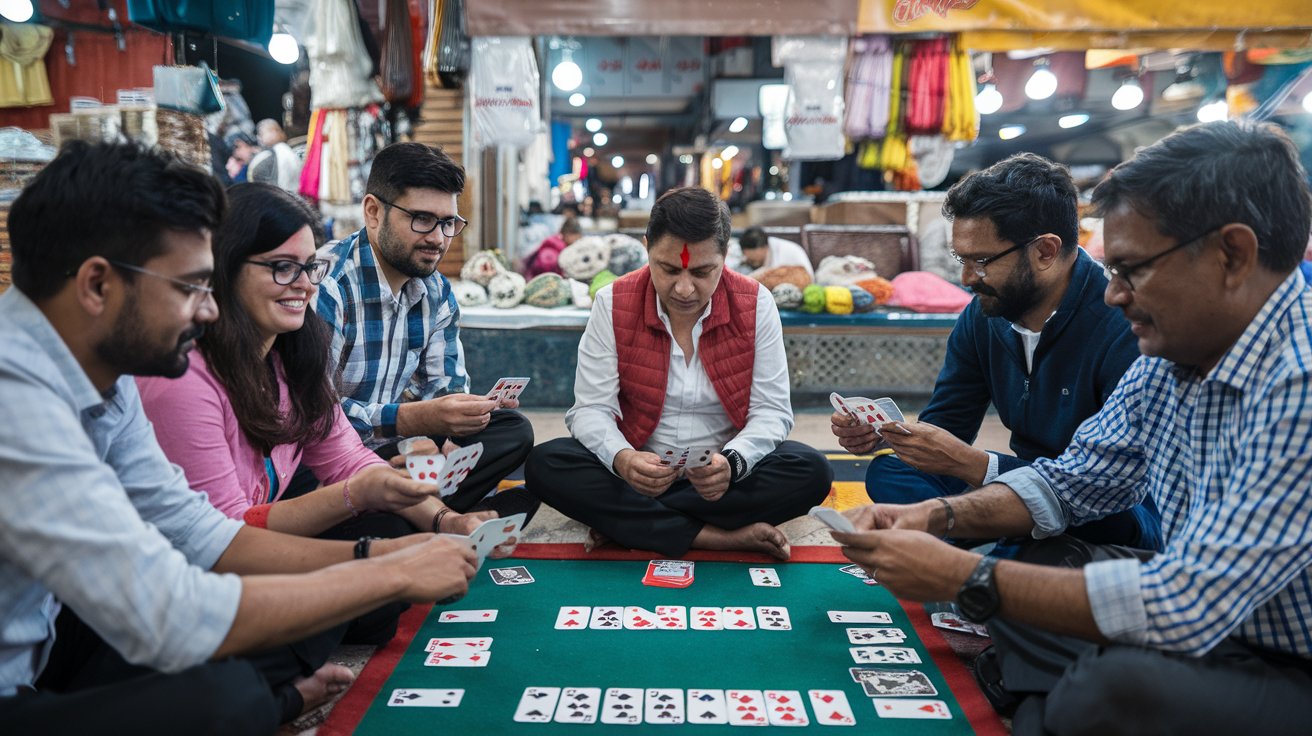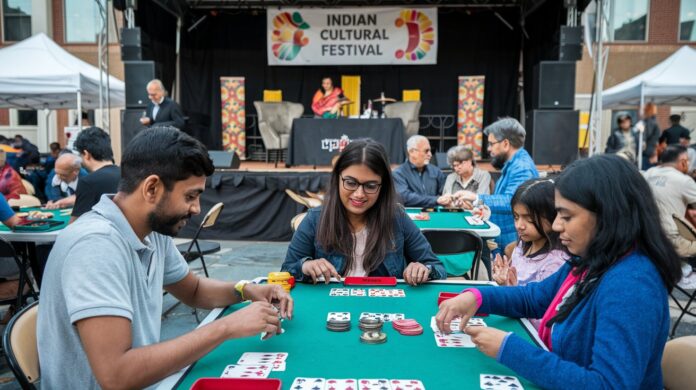In the vibrant tapestry of Indian recreational culture, few games have embedded themselves as deeply as rummy. Far beyond being just a card game, rummy has evolved into a cultural institution that transcends regions, languages, and generations. From festive family gatherings to midnight sessions during power cuts, from royal courts to village chaupals, the shuffling of cards and the thoughtful silence of players contemplating their next move has become an intrinsic part of India’s social fabric. This article explores the rich cultural significance of rummy in India, tracing its historical roots, regional variations, and evolution into the digital age, while examining how this seemingly simple card game continues to reflect and shape aspects of Indian society.
Historical Origins: How Rummy Found Its Way to Indian Homes
The precise origins of rummy in India remain a subject of fascinating debate among historians and gaming enthusiasts. While the game’s fundamental concept of matching cards into sets and sequences appears in various card games worldwide, rummy’s journey to becoming a household name in India has multiple origin theories.
Colonial Influence and Indigenous Adaptation
One prevalent theory suggests that the British introduced rummy to India during the colonial period in the 19th century. Like cricket and tea, the game found fertile ground in Indian society, where it was embraced, modified, and ultimately transformed into something uniquely Indian. The game’s adaptability allowed it to be played with standard 52-card decks that were becoming increasingly available during this period.
Connection to Traditional Indian Games
Other historians point to indigenous card games that predated colonial contact. Ancient Indian texts mention card games that shared structural similarities with modern rummy. The traditional game of “Ganjifa,” played with elaborately decorated round cards in royal courts across medieval India, featured matching mechanics that bear resemblance to certain aspects of rummy. These indigenous games may have facilitated the easy adoption of rummy when it was introduced.
The Middle Eastern Route
A third theory proposes that rummy reached India through trade routes connecting the Middle East, where similar games were popular. The game of “Conquian,” considered by many to be an ancestor of modern rummy, may have traveled along these routes, eventually finding its way into Indian homes.
Regardless of its exact path to India, by the early 20th century, rummy had established itself as a popular pastime across the subcontinent, with regional variations beginning to emerge that reflected local preferences and cultural nuances.
Regional Variations: The Many Flavors of Indian Rummy

As rummy spread throughout India, it naturally evolved into distinct regional variants, each with unique rules, terminology, and cultural contexts. These variations reflect India’s linguistic and cultural diversity while maintaining the game’s core principles.
Points Rummy: The Pan-Indian Favorite
Perhaps the most universally played variant across India, Points Rummy assigns point values to cards and focuses on quick gameplay. This variant has found particular popularity in urban centers and is often the gateway through which new players are introduced to the game.
Marriage Rummy: Popular in Western India
Prevalent in Gujarat, Maharashtra, and parts of Rajasthan, Marriage Rummy (sometimes called “Contract Rummy”) involves completing specific contracts or combinations in sequential rounds. The name reflects the “marriages” or pairs of cards that players must form.
Deals Rummy: The South Indian Specialty
Particularly popular in the southern states of Tamil Nadu, Kerala, and Andhra Pradesh, Deals Rummy involves a fixed number of deals with cumulative scoring. This variant often features in family gatherings and festive celebrations in South India.
21 Cards Rummy: Northern Tradition
Common in Punjab, Haryana, and Uttar Pradesh, this variant uses 21 cards per player and emphasizes strategic discarding. It’s often played during long winter evenings and has become associated with harvest festivals in these regions.
These regional variations do more than just provide different gaming experiences—they offer valuable insights into local cultural priorities, from the fast-paced gameplay favored in bustling metros to the more elaborate, socially-oriented versions popular in rural communities.
Rummy in Indian Social Life: Beyond Just a Game

The significance of rummy in Indian culture extends far beyond its rules and gameplay mechanics. The game has ingrained itself as a social institution that facilitates bonding, reinforces relationships, and even serves as a conduit for cultural values.
Family Traditions and Intergenerational Bonding
In many Indian households, rummy serves as a bridge between generations. Grandparents teach grandchildren the game during summer vacations, passing down not just rules but family stories, life lessons, and values. Many Indians recall their first rummy game as a rite of passage, marking their entry into the adult world of strategic thinking and social etiquette.
Festival Connections
Certain festivals across India have traditional associations with card games, particularly rummy. During Diwali, the Festival of Lights, playing cards is considered auspicious in many communities. The goddess Lakshmi, who represents wealth and prosperity, is believed to visit homes where people are engaged in games of chance and skill—making rummy sessions an integral part of Diwali celebrations. Similarly, Janmashtami in northern India and Onam in Kerala often feature rummy tournaments as part of community celebrations.
Gender Dynamics and Social Change
Historically, card games in India were predominantly male activities, often played in segregated spaces. Rummy, however, evolved differently. Its accessibility and focus on analytical thinking rather than gambling made it more acceptable for mixed-gender play. In many households, rummy became one of the first recreational activities where women participated equally with men. Today, all-women rummy circles are common across India, representing spaces of female bonding and empowerment.
The Chai-Rummy Connection
No discussion of rummy’s cultural significance would be complete without mentioning its intimate association with tea culture. The phrase “chai pe charcha aur rummy” (discussion over tea and rummy) captures this quintessential Indian experience. The rhythmic shuffling of cards often synchronizes with the clinking of teacups, creating a multisensory social experience that has become emblematic of Indian hospitality and leisure.
Rummy and Indian Values: Lessons Beyond the Table
What makes rummy particularly significant in Indian culture is how the game embodies and reinforces core cultural values and life lessons.
Patience and Strategic Thinking
The Indian philosophical tradition places high value on patience (dhairya) and foresight. Rummy, with its emphasis on planning several moves ahead while adapting to changing circumstances, reinforces these values. Parents and elders often use the game to teach children the importance of patience and strategic thinking.
Mathematical Aptitude and Mental Agility
India’s strong mathematical tradition finds expression in rummy’s requirement for quick numerical calculations and probability assessments. The mental arithmetic involved in tracking cards and calculating points has led many Indian families to encourage rummy as an educational activity that sharpens mathematical skills while entertaining.
Dealing with Uncertainty
In a culture deeply influenced by concepts like karma and kismet (fate), rummy offers a microcosm for understanding how to navigate uncertainty. The random distribution of cards represents the uncontrollable aspects of life, while skillful play demonstrates how to make the best of what fate deals you—a lesson that resonates deeply with Indian philosophical outlooks.
Graceful Winning and Losing
The concept of “sporting spirit” or how one handles victory and defeat is emphasized through rummy in many Indian families. Elders use the game to teach children that winning without arrogance and losing with dignity are marks of good character, reflecting values emphasized in traditional texts like the Bhagavad Gita.
The Economic Dimension: From Pastime to Profession
Rummy’s cultural significance in India has acquired an economic dimension that reflects broader changes in Indian society and its relationship with games of skill.
Tournament Culture
Organized rummy tournaments have become increasingly common, especially in urban centers. These events, often sponsored by local businesses or community organizations, offer prize money and prestige to skilled players. Annual tournaments during festivals like Diwali can attract hundreds of participants and spectators, becoming significant community events.
The Rise of Professional Players
With the legitimization of rummy as a game of skill rather than chance (reinforced by Supreme Court judgments), a small but growing number of Indians have begun to approach rummy as a profession rather than merely a pastime. These professional players study the game systematically, participate in high-stakes tournaments, and even coach others.
Rummy Clubs and Social Status
In certain communities, membership in prestigious rummy clubs has become a marker of social status. These clubs, often with selective membership criteria and annual tournaments, represent spaces where business connections are made, social capital is accumulated, and reputations are built—all through the medium of the game.
Digital Transformation: Rummy in the Internet Age

Perhaps the most significant evolution in rummy’s cultural journey has been its adaptation to the digital realm, a transformation that both preserves and reimagines the game’s traditional significance.
Online Platforms and Accessibility
The proliferation of online rummy platforms has democratized access to the game. People from small towns and villages who might never have joined formal rummy clubs can now participate in national tournaments. This digital accessibility has expanded rummy’s cultural footprint while preserving its essential character as a game of skill and strategy.
Preserving Cultural Heritage Through Technology
Interestingly, digital platforms have become unexpected preservers of rummy’s cultural heritage. Many online platforms offer all major regional variants, complete with traditional terminology and rules, ensuring that these cultural expressions remain accessible to younger generations who might otherwise have lost connection with them.
Changing Social Dynamics
Online rummy has transformed some of the game’s social aspects. While the face-to-face interaction is diminished, new forms of community have emerged through chat functions, forums, and social media groups dedicated to the game. These digital communities often transcend regional and linguistic boundaries, creating pan-Indian and even international rummy communities.
Legal Recognition and Cultural Legitimacy
The legal recognition of online rummy as a game of skill by various High Courts and the Supreme Court of India has further cemented its cultural legitimacy. These judgments have not only clarified rummy’s legal status but have also articulated its cultural significance as a traditional game requiring mathematical ability and analytical thinking.
Challenges and Controversies: Navigating Modern Complexities
The cultural journey of rummy in India has not been without challenges, particularly as the game navigates the complex terrain of digital transformation and changing social attitudes.
Addressing Addiction Concerns
As with many engrossing activities, there are legitimate concerns about excessive play and potential addiction. The cultural narrative around rummy is evolving to incorporate discussions about responsible gaming, with families and communities developing informal norms and practices to ensure the game remains a healthy pastime rather than a problematic obsession.
Distinguishing Skill from Gambling
The legal and cultural distinction between rummy (a game of skill) and gambling remains important in the Indian context. Communities and platforms continue to navigate this distinction, emphasizing the skill-based nature of rummy while distancing it from purely chance-based gambling activities that carry different cultural and legal implications.
Balancing Tradition and Innovation
As rummy evolves, particularly in its online avatar, there’s an ongoing conversation about balancing innovation with cultural authenticity. How much can the game change while still remaining recognizably part of Indian cultural heritage? This question reflects broader debates about cultural preservation in a rapidly changing society.
Conclusion: Rummy’s Enduring Cultural Legacy
The journey of rummy in India from a colonial-era import to a deeply embedded cultural institution reflects the country’s remarkable ability to adopt, adapt, and transform external influences into something uniquely Indian. Today, whether played on hand-woven durries (cotton rugs) in village homes, in air-conditioned club rooms in metropolitan cities, or on smartphones during commutes, rummy continues to serve as:
- A repository of traditional values and social norms
- A medium for intergenerational bonding and cultural transmission
- A space for gender-inclusive recreation
- A showcase for mathematical and analytical abilities
- A reflection of regional diversity within a common cultural framework
As India continues its rapid social and technological transformation, rummy’s cultural significance may evolve in unexpected ways. Yet its core position as a game that combines chance, skill, strategy, and social connection ensures that it will likely remain an integral thread in the cultural tapestry of India for generations to come.
From family Diwali gatherings to competitive online tournaments, from teaching children patience to building business networks, rummy’s remarkable versatility and cultural resonance have secured its place not just as a game Indians play, but as a reflection of who they are. In the shuffling, dealing, and thoughtful play of rummy, the values, contradictions, adaptability, and continuity of Indian culture itself can be glimpsed—one hand at a time.

Zareb Saleh is a journalist at Gulf Today and a ghostwriter for Gameoholic, specializing in gaming, technology, and digital culture. With a keen eye for industry trends, he delivers insightful stories that engage and inform readers.




